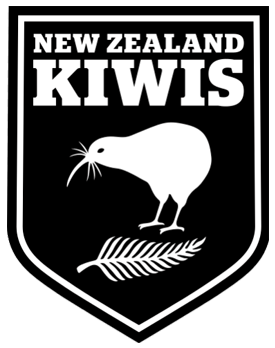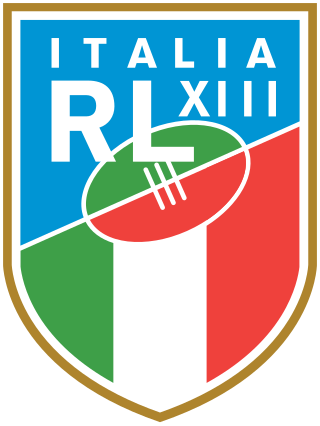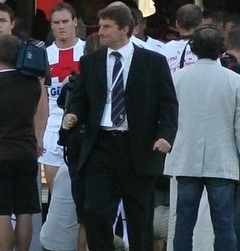The 1954 Rugby League World Cup was rugby league football's first World Cup and was held in France in October–November 1954. Officially known as the "Rugby World Cup", four nations competed in the tournament: Australia, France, Great Britain and New Zealand. A group stage was held first, with Great Britain topping the table as a result of points difference. They went on to defeat France in the final, which was held at Paris' Parc des Princes before 30,368 spectators.
The second Rugby League World Cup was held in Australia in 1957. As before a group stage was held first, with matches being held at locations in Sydney and Brisbane.
The 1968 Rugby League World Cup tournament was the fourth staging of the Rugby League World Cup, and was held in Australia and New Zealand during May and June in 1968. Contested by the men's national rugby league football teams of the two host countries plus Great Britain and France, for the first time a final to determine the World Cup was specifically pre-arranged. Financially it was a profitable venture for the competing nations.

The 1975 Rugby League World Championship was the seventh tournament for the Rugby League World Cup. The format differed from that employed in previous competitions; no single country hosted the matches, which were spread out in a 'world series' hosted by each of the five participating nations over a period of just over eight months. Each team had to play the others on a 'home and away' basis. Great Britain were split up into separate England and Wales teams, taking advantage of a glut of Welsh talent in the British game at the time.

The 1995 Rugby League World Cup was held during October in the United Kingdom. It was the eleventh staging of the Rugby League World Cup and was marketed as the Halifax Centenary World Cup, reflecting the tournament's sponsorship and the fact that 1995 marked the centenary of the sport. Envisaged as a celebration of rugby league football, the size of the competition was doubled, with four additional teams invited and Great Britain split into England and Wales
The 2000 Rugby League World Cup was the twelfth staging of the Rugby League World Cup. It was held in the United Kingdom, Ireland, and France, and took place between 28 October and 25 November 2000. Sixteen national teams competed in four groups of four, playing each other once over three weekly rounds before a series of play-offs that culminated in the final between Australia and New Zealand. Tournament favourites Australia defeated New Zealand in the final, claiming their sixth consecutive and ninth total Rugby League World Cup title. Australian winger Wendell Sailor was named player of the tournament.

The 2008 Rugby League World Cup was the thirteenth staging of the Rugby League World Cup since its inauguration in 1954, and the first since the 2000 tournament. The tournament was held in Australia from 26 October, culminating in the final between Australia and New Zealand on 22 November.

The Great Britain national rugby league team represents Great Britain in rugby league. Administered by the Rugby Football League (RFL), the team is nicknamed The Lions.

The Australian National Rugby League Team, the Kangaroos, have represented Australia in senior men's rugby league football competition since the establishment of the 'Northern Union game' in Australia in 1908. Administered by the Australian Rugby League Commission, the Kangaroos are ranked fourth in the RLIF World Rankings. The team is the most successful in Rugby League World Cup history, having contested all 16 and won 12 of them, failing to reach the final only once, in the inaugural tournament in 1954. Only five nations have beaten Australia in test matches, and Australia has an overall win percentage of 70%.

The New Zealand national rugby league team has represented New Zealand in rugby league since 1907. Administered by the New Zealand Rugby League, they are commonly known as the Kiwis, after the native bird of that name. The team's colours are black and white, with the dominant colour being black, and the players perform a haka before every match they play as a challenge to their opponents. The New Zealand Kiwis are currently second in the IRL World Rankings. Since the 1980s, most New Zealand representatives have been based overseas, in the professional National Rugby League and Super League competitions. Before that, players were selected entirely from clubs in domestic New Zealand leagues.
The Rugby League Tri-Nations was a rugby league tournament involving the top three teams in the sport: Australia, Great Britain and New Zealand and is the predecessor of today's Rugby League Four Nations.

The France national rugby league team represent France in international rugby league matches. They are referred to as les Chanticleers or less commonly as les Tricolores. The team is run under the auspices of the Fédération Française de Rugby à XIII.

The England national rugby league team represents England in international rugby league.

The International Rugby League (IRL) is the global governing body for the sport of rugby league football. Previously known as the Rugby League Imperial Board, the International Rugby League Board and latterly the Rugby League International Federation, the IRL is responsible for the Laws of the Game, the development, organisation and governance of rugby leagues internationally, and for the sport's major international tournaments; most notably the Rugby League World Cup.

The Italy national rugby league team represents Italy in rugby league football. With origins dating back to the 1950s and 1960s, the team has competed regularly in international competitions since 2008, when their current governing body, the Federazione Italiana Rugby League, was formed. They are currently ranked 16th in the IRL World Rankings.

Stuart Fielden is an English former professional rugby league footballer who played in the 1990s, 2000s and 2010s. He was formerly an assistant coach for the Huddersfield Giants in the Super League, and now is a Personal trainer of Fielden Fitness in Leeds. A Great Britain international representative forward, he played his club rugby for Bradford Bulls with whom he won the 2001, 2003 and 2005 Super League Championships, 2000 and 2003 Challenge cups and World Club championships in 2002, 2004, 2006 before he moved to Wigan Warriors for a record transfer fee in 2006, winning the 2010 Super League Championship with them. He then signed with Huddersfield Giants in 2013 but played only a handful of games (9) before injury forced him into retirement. Fielden won 2 individual awards of young player of the year (2000) and International best forward (2005).He was named in 4 super league and 4 International dream teams.

Tony Smith is a professional rugby league coach and former player

The Rugby League World Cup is an international rugby league tournament contested by the top national men's representative teams. The tournament is administered by the International Rugby League and was first held in France in 1954, which was the first World Cup held for any form of rugby football.
Jermaine McGillvary is an English professional rugby league footballer who plays on the wing for the Huddersfield Giants in the Super League. He has played for the England Knights, England and Great Britain at international level.
The 1954 Rugby League World Cup Final was the conclusive game of the 1954 Rugby League World Cup tournament and was played between France and Great Britain on 13 November 1954 at the Parc des Princes in Paris, France.















